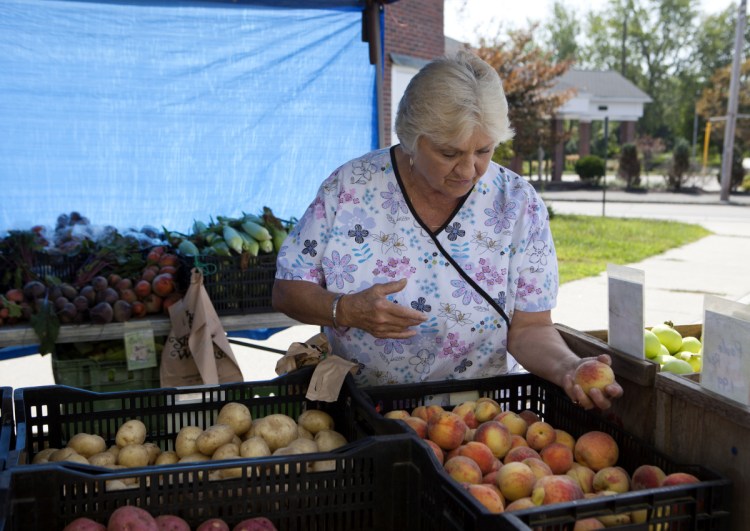An influx of federal aid is bolstering a program designed to make sure Maine seniors get fresh vegetables.
The U.S. Department of Agriculture boosted its support for the Maine Senior FarmShare Program by $60,000 this summer, allowing the program’s manager to clear a waiting list and open the program to an additional 1,000 Maine seniors.
Donna Murray, who runs the program for the state’s department of agriculture, said she is working with senior agencies throughout Maine to find new participants in addition to the 17,000 or so who have already signed up. To be eligible, seniors must be 60 or older and have household incomes of no more than 185 percent of the poverty level, which for a family of two is $30,451 per year.
The Maine Senior FarmShare Program operates similar to community-supported agriculture programs that many farms offer. Seniors sign up and choose a farm to work with. The farm gets $50 per participant and seniors can purchase fresh vegetables and draw down against that credit over the course of the growing season.
“It not only helps the seniors, it helps our local farmers,” Murray said.
The program is part of an effort to address the nutritional needs of seniors, a growing problem in Maine and elsewhere. According to a report issued recently by the Good Shepherd Food Bank of Maine, about one in three seniors in the state faces either hunger or the threat of hunger and the number who face food insecurity – uncertainty about where the next meal is coming from – has doubled in the last five years.
Murray said the program addresses those issues by making sure that seniors can at least get some amount of fresh vegetables in their diets, particularly during the fall as the crops are coming in.
A survey the program conducted two years ago found that nearly 92 percent of seniors said they ate more fruits and vegetables because of the program.
That’s common sense, said a farmer who participates in the program.
“A a lot of people aren’t going to spend the few dollars they have on fresh greens, they’re going to look for the 39-cent can,” said Caitlyn Jordan, one of the family members who run Alewive’s Brook Farm in Cape Elizabeth.
Jordan said her parents signed up with the program when it began nearly two decades ago. Now, they have 250 seniors who participate, either by shopping at the farm’s market or going to the almost-daily farmers markets where Alewive’s Brook sets up.
Jordan said the farm also regularly sets up stands at two assisted-living centers to bring the produce to the seniors living there.
She said the farm keeps track of purchases on paper and has a running tally of the seniors’ accounts. The program’s flexibility is a plus, Jordan said.
There are favorites among the farm’s output, she said, but just about everything that’s fresh is in some demand.
“Some will use it all up on strawberries and others will want to save up for winter squash,” Jordan said. “They’ll use it up on two or three trips or spread it out.”
Ruth Knight, 73, of South Portland, who signed up with Alewive’s Brook Farm, said she tries to spread her purchases throughout the year.
“I like the winter squash and fresh tomatoes in the summer and cucumbers, peas in the pod, corn on the cob and things like that,” she said. “It’s a lot of savings for me.”
Knight said she’s also learning how to preserve food. A friend helps her with putting up peppers, she said, and Jordan has been teaching her about canning jellies and fruit.
Knight will either get her vegetables direct from the farm on Old Ocean House Road, where there’s a small store selling fresh goods from the fields, or go to the farmers market in Knightville in South Portland on Sundays.
The farms are paid the $50 per participant up front in the spring, which Jordan said is a welcome influx of cash at a critical time. Spring is an expensive time for farmers, who have to get seeds in the ground and fertilizer spread in the space of a few weeks.
“It’s a huge help,” said Jordan,
Murray said there’s a side benefit to the program in addition to the nutritional boost. Although some farms deliver, in most cases the seniors are traveling to farms or farmers markets to get their vegetables. So they get out of the house and overcome the growing problem of social isolation among seniors.
Plus, she said, the program sets up another set of eyes to keep watch on the seniors. She said most seniors make regular visits to the farms or markets and farmers recognize if the regulars don’t show up. Some farmers, Murray said, make calls to check on the seniors and make sure they’re all right.
“It’s another connection for the seniors,” she said.
The program is still small, Murray said, especially given Maine’s aging population. But she hopes to publicize it more next year and is planning to team up with a nutritionist to visit senior centers and discuss how to cook and preserve farm-fresh vegetables.
Edward D. Murphy can be contacted at 791-6465 or at:
emurphy@pressherald.com
Send questions/comments to the editors.




Comments are no longer available on this story